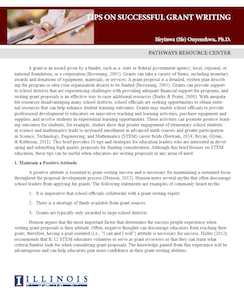With inequitable resources disadvantaging school districts with predominantly low income and minority students, many school officials are seeking additional support, in the forms of grant funding, to enhance student learning outcomes. Studies show that greater engagement of elementary school students in science and math leads to increased enrollment in higher level math courses and STEM careers (Bertram, 2014; Bryan, Glynn, & Kittleson, 2011). Grants may enable teachers to invest in activity based learning, purchase supplies, and involve students in experiential learning opportunities. Each year, public and private sources of funding are allocated to school districts that submit grant proposals. Ifeyinwa Onyenekwu offers ten steps school districts can employ that will assist them in the grant writing process in her brief, "Tips on Successful Grant Writing." This brief will be beneficial to any school district staff interested in writing grants despite experience level.
Below I share five tips and strategies provided by Henson (2012) regarding grant seeking and grant writing. Kenneth Henson (2012) is the author of Successful Grant Writing for School Leaders. He posits that a good attitude is essential to the grant writing process. He adds that there are a number of myths that discourage school leaders from applying for a grant. The following statements are examples of commonly heard myths:
- It is imperative that schools collaborate with an expert.
- There is a shortage of funds available.
- Money goes to larger and more popular school districts.
Henson argues that the most important factor that determines the degree of success people experience when writing grant proposals is their attitude. Often, negative thoughts can discourage educators from reaching their goals. Therefore, having a goal-oriented (i.e., “I can and I will”) attitude is necessary for success. Haller (2012) encourages K-12 STEM educators to volunteer as a grant reviewer and learn what funders are looking for in grant proposals. The knowledge gained from this experience will be advantageous when crafting a grant proposal.
Find Funding Sources
Most educators are interested in learning about where to locate grant-funding sources. The federal government provides a publication of grant opportunities. To access this list online, go to www.Grants.gov. Illinois educators can also find state-funded grants on the Illinois State Board of Education website.
Create a Checklist
Creating a checklist of all the items that you need to complete an application is helpful in ensuring that application guidelines and requirements are met. While some federal and state grants may provide a checklist, it is beneficial to create one if it is not provided by the potential funder.
Know your Capabilities
It is important not to overestimate your abilities or the expectations of the proposal. Therefore, it is beneficial to craft an objective that is both reasonable and feasible. A good proposal has clear, attainable, and measurable objectives. For instance, if a goal is set to improve students’ science test scores, measure this goal by analyzing pre- and post-test data after students have participated in the grant activity.
Propose an Innovative Idea
Granting organizations appreciate original and/or unique proposals that address a problem. Funders provide seed money to help pilot or establish new ideas in order to encourage new strategies and approaches.
Writing Style
Grant writing requires clarity. In order to achieve this, avoid past tense, exercise brevity, and use action verbs. Visuals such as graphics and tables can help illustrate the goal of your proposal and should be added to improve communication. Writers should be prepared to revise and self-edit a few drafts of a grant proposal. Avoid the use of fancy and unnecessary words, as well as educational jargon. An effective grant proposal explains the goals to the evaluators in a straightforward and succinct manner.
Sources
Bertram, V. (2014). One nation under taught: Solving America’s science, technology, engineering, and math crisis. New York, NY: Beaufort Books.
Bryan, R. R., Glynn, S. M., & Kittleson, J. M. (2011). Motivation, achievement, and advanced placement intent of high school students learning science. Science Education, 95, 1049-1065.
Henson, K. (2012). Successful grant writing for school leaders: 10 easy steps. Upper Saddle River, NJ: Pearson Education Inc.
Haller, D. (2012). 7 Tips for funding your STEM education effort. Retrieved from http://stemeducators.blogspot.com/2012/04/7-tips-for-funding-your-stem-education.html
Ifeyinwa (Ife) Onyenekwu's research focuses on policy and practices impacting the K-20 education system and students’ college readiness. She is particularly interested in understanding how stakeholders connect research to policy and practice.
